You are using an out of date browser. It may not display this or other websites correctly.
You should upgrade or use an alternative browser.
You should upgrade or use an alternative browser.
A Glorious Union or America: the New Sparta
- Thread starter TheKnightIrish
- Start date
Threadmarks
View all 207 threadmarks
Reader mode
Reader mode
Recent threadmarks
Chapter One Hundred and Fifty Nine The Long Road Home Chapter One Hundred and Sixty A New Beginning Part I Chapter One Hundred and Sixty One A New Beginning Part II Chapter One Hundred and Sixty Two A New Beginning Part III Chapter One Hundred and Sixty Three The Emperor is Enthroned Chapter One Hundred and Sixty Four The Emperor's Coat-tails Part One Chapter One Hundred and Sixty Five The Emperor's Coat-tails Part Two Chapter One Hundred and Sixty Six The Consuls of His EmpireDeleted member 81475
Always happy to see an update here! Tegener, Cailloux, Birney... the country is definitely changing. And I'm always a fan of Latimer McCook with his magnificent portrait. I'm looking forward to seeing the new congress and cabinet, as well as how Kearny actually does now that he's commander in chief.
The politics of this post-war are more chaotic than I had imagined! The Bureau of Collectors is certainly living up to a nefarious reputation... the amount of compromise and movement within the states is definitely going to have some interesting long term consequences. And Texas, well Texas is certainly just as interesting as I expected.
Well now you have asked I think I must! I will also refer to some of the diplomatic appointments...Great update KI. Will we get a list on the territorial governor's as well?
Where's Carl Schurz in all this?
Schurz was captured at the Battle of the Rappahannock. On his exchange his military career was effectively dead. Lincoln sent him for a second time as a trusted emissary to Spain. After a short break he has been returned there (for a third time) during Lincoln's Second Term where he currently remains as Envoy Extraordinary and Minister Plenipotentiary...
What will become of Proscription?
While there are living rebels at home and abroad it is unlikely to go anywhere without a major change of policy. As to whether the principle changes over time...who can say...
Will we at some point perhaps learn of the fates of some the Exilados Grise beyond Mexico, perhaps even some of the exploits of those in the service of the Sultan mentioned briefly during the Abyssinian Expedition?
I live in hope the future auteurs of Carlotta produce some truly Errol Flynn worthy swashbucklers, not the least of which may be the "In The Service of The Sultan" lol
On another note could Selah Merrill possibly be won over to collectivist thought or it's predecessor by a different experience of the American Colony in Jerusalem?
I live in hope the future auteurs of Carlotta produce some truly Errol Flynn worthy swashbucklers, not the least of which may be the "In The Service of The Sultan" lol
On another note could Selah Merrill possibly be won over to collectivist thought or it's predecessor by a different experience of the American Colony in Jerusalem?
Will we at some point perhaps learn of the fates of some the Exilados Grise beyond Mexico, perhaps even some of the exploits of those in the service of the Sultan mentioned briefly during the Abyssinian Expedition?
I live in hope the future auteurs of Carlotta produce some truly Errol Flynn worthy swashbucklers, not the least of which may be the "In The Service of The Sultan" lol
On another note could Selah Merrill possibly be won over to collectivist thought or it's predecessor by a different experience of the American Colony in Jerusalem?
Of course - Cleburne Pasha has been long in the planning...
Actually the Mexican Hollywood will be in Puerto Vallarta...I think that's been touched on before.
Selah Merrill is unlikely to be found in Jerusalem for reasons that will become obvious. However another major figure will soon find themselves in Jerusalem as part of an epic journey...
I don't know if it's already been addressed, but what's the popular view of the XI Corps and the performance of German-American troops in general post-war? I imagine it's better than OTL given that it could hardly be worse, but how much better?
I don't know if it's already been addressed, but what's the popular view of the XI Corps and the performance of German-American troops in general post-war? I imagine it's better than OTL given that it could hardly be worse, but how much better?
They have had a much easier time of it in TTL by many measurements. However they took a real pasting at Gettysburg, taking awful casualties following Meade in his charge to repulse the Confederate flanking manoeuvre at Wolf Hill. They spent much of the rest of war on garrison duty in Virginia. The 'Hessians' of the XI Corps might not have popular in Virginia but I suspect no one is left who is stupid enough to say so out loud! Also some of the officers have come out better especially von Steinwehr - Kearny's pet "Prussian" (Steinwehr was in fact a Brunswicker and not a 48'er).
I now have a full list for the Senate in the 41st Congress so I just need a free evening for the next chapter.
Chapter One Hundred and Sixty Five The Emperor's Coat-tails Part Two
Chapter One Hundred and Sixty Five
The Emperor's Coat-tails
Part Two
From "A Summary of the Elections in the Transition from the Second to the Third Party System" by Prof. James GilmoreThe Emperor's Coat-tails
Part Two
Mississippi State 1964
"Following re-admittance of the Southern States and Kearny's nomination for the National Union Party there was tumultuous change in the House of Representatives in 1868/69. The Democrats rose from 40 to 52 seats. The Republicans fell from 141 to 128. However these were not losses to the Democrats. Rather many Republicans re-branded themselves as National Unionists and in doing so held onto both the votes of War Democrats and Radical Republicans. In fact National Unionists rose from 28 to 61 seats...
The Senate of the 41st Congress contained many familiar faces but it was nonetheless a changed body. Aside from the return of the Class 1 Senators, the readmitted Southern States began appointing fresh Class 2 and 3 Senators according to their new state constitutions…
Alabama:
Henry C. Sanford (Republican) – Another anti-secessionist delegate to the Alabama Convention in 1861 this Methodist Episcopal minister was a self-described radical republican and darling of both freedmen and committed Alabama Unionists alike…
Arkansas:
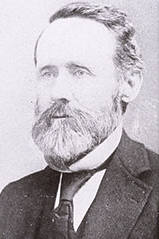

Andrew Hunter (National Unionist) – “The Grand Old Man of Arkansas” and “The Patriarch of Methodism” this Ulsterman was the chosen candidate of the spinners and enfranchised democrats left in Arkansas. He fervently believed in the reuniting of the Southern and Northern churches and was comfortable with the abolition of slavery…
California:
James McClatchy (Republican) – Editor of the Sacramento Bee and nemesis of the corrupt businessman and politician McClatchy was a confirmed Radical Republican.
John Conness (National Unionist) – Formerly identifying as a Republican, Conness’ rebranding as a National Unionist may have saved his bacon. Returned by the legislature by just one vote, Conness was an early proponent of equal rights for non-whites. Not only was he a champion of freedmen but also of Chinese immigrants to the state of California…
Connecticut:
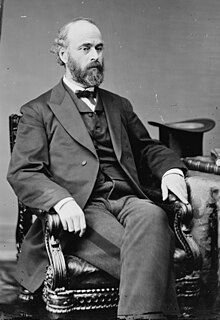
William Alfred Buckingham (Republican)
Delaware:
Henry du Pont (National Unionist)
Thomas F. Bayard (Democrat)
Florida:

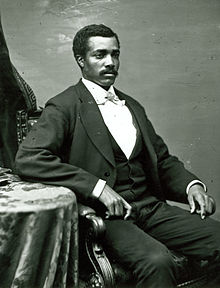
Josiah T. Walls (Republican) – born a slave, Walls rose to become a sergeant in the 3rd United States Colored Infantry. A significant figure in the Floridian Constitutional Convention, Walls would be the first African American to serve in Congress from Florida…
Georgia:
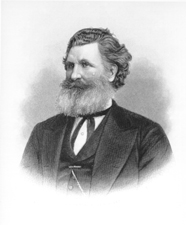
William Washington Gordon II (Nationalist Unionist) – initially a Lieutenant in the Georgia Hussars in the Confederate service, Gordon resigned his commission following the murder of his wife’s uncle, General David Hunter, by the Confederate Government. Initially uncooperative with rebel government, he slowly became a more and more outspoken unionist. By birth and education a southern gentleman; by bitter experience a genuine spinner; Gordon is generally popular across the remaining enfranchised whites of Georgia. However the Office of Proscription has a file on Gordon as a former junior rebel officer...
Illinois:
Richard Yates (Republican)
Lyman Trumbull (Republican)
Indiana:
Oliver H.P.T. Morton (Republican)
Robert H. Milroy (Republican) – Milroy parleyed his fame from the post-war military tribunal into a political career in his home state of Indiana. A red rag radical Milroy was forever invoking the name of David Hunter and, to quote one opponent “to hear him you would have thought that Robert H. Milroy himself had hung Jeff Davis by his own hand”…
Iowa:
James W. Grimes (Republican)
James Harlan (Republican)
Kansas:
James H. Lane (Republican)
Samuel C. Pomeroy (Republican)
Kentucky:
Thomas E. Bramlette (Republican)
Green Clay Smith (National Unionist) – Former Congressman and Colonel of the 4th Kentucky Cavalry, he had risen to command a brigade of cavalry. Following Lovell Rousseau’s elevation to the Vice-Presidency he was chosen by the legislature (i.e. Bull Nelson) to serve out Rousseau’s term…
Louisiana:
Louis Charles Roudanez (Republican) – founder of the first newspaper in the South aimed at African-Americans, he was opposed to the nomination of “yankees” to political office in the South. Uniting the prosperous creoles and “mulattoes” with the state spinners in the legislature he secured nomination to the Senate...
Francis E. Dumas (Republican) – an octroon who spoke five languages and lived in France for several years, he had inherited his father’s plantation just before the war. Rising to Major in the Louisiana Native Guards during the war he had a distinguished war record. A close ally of Roudanez he formed part of the state’s creole Republican alliance in trying to keep Sickles’ and his yankee nominees out of office...
Maine:
Hannibal Hamlin (Republican)
William Pitt Fessenden (Republican)
Maryland:
Reverdy Johnson (Democrat)
George Vickers (Democrat)
Massachusetts:
Charles Sumner (Republican)
Henry Wilson (Republican)
Michigan:
Zachariah Chandler (Republican)
Jacob M. Howard (Republican)
Minnesota:
Alexander Ramsey (Republican)
Daniel S. Norton (Republican)
Mississippi:
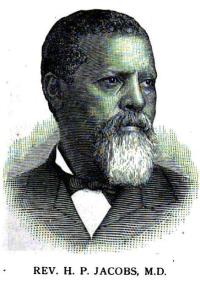
Henry P. Jacobs (Republican) - escaping slavery in Alabama with most of his family, Jacobs lived in Canada and Michigan where he became a Baptist minister. Moving Jackson during the war to serve a mission he became active in the Freedmen's Bureau and helped organise negro ex-soldiers into cooperative farming communities on former plantations. Serving in the Constitutional Convention he was nominated by the legislature to the Senate...
Missouri:
Benjamin Gratz Brown (Republican)
Carl Schurz (National Unionist)
Nebraska:
Robert Ramsay Livingstone (National Unionist) - A surveyor and mine owner who rose to command of the 1st Nebraska Infantry he was a notable figure in the state.
John M. Thayer (Republican)
Nevada:
William Morris Stewart (Republican)
James W. Nye (Republican)
New Hampshire:
John P. Hale (Republican)
Thomas M. Edwards (Republican)
New Jersey:
John P. Stockton (Democrat)
Frederick Theodore Frelinghuysen (Republican)
New York:
Roscoe Conkling (Republican)
Edward D. Morgan (Republican)
North Carolina:
George Washington Kirk (National Unionist) - first a rebel officer his Union sympathies led him to resign and flee to Union lines where he ultimately became Colonel of the 3rd North Carolina (USA) Cavalry. Serving as a aide during Hancock's military governorship he had built up a sufficient network to get nominated to the Senate...
Tod Robinson Caldwell (Republican)
Ohio:
Benjamin Wade (Republican)
John Sherman (Republican)
Oregon:
George H. Williams (Republican)
Henry W. Corbett (Republican)
Pennsylvania:
Simon Cameron (Republican)
James Shields (Republican) - the famous Irish American general (who almost fought a duel with Lincoln) was another officer who turned his fame arising out the coverage of the military tribunals to his favor. Already a senator from Illinois and Minnesota before the war, he settled in Pennsylvania after the war. He holds the record for holding senatorial office from three separate states...
Rhode Island:
William Sprague IV (Republican)
Henry B. Anthony (Republican)
South Carolina:

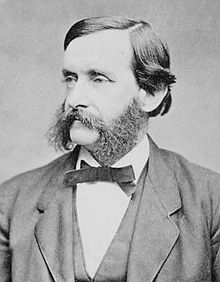
Thomas Wentworth Higginson (Republican) - a fierce abolitionist and secret supporter of John Brown, Higginson had become the colonel of the First South Carolina Volunteers made up of freedmen. "I did not join to teach lessons, but to receive them" he proclaimed. Initially a popular figure, his advocacy of women's rights would cause contravesy.
Tennessee:
William H. Wisener (Republican) - one of just five representatives in the Tennessee Secession Convention to oppose secession Wisener was an outspoken unionist. He continued to vote against acts opposing the federal government and supporting the rebellion. His record did come under intense scrutiny during the Constitutional Convention but he had the support of Andrew Jackson who, though waning in influence in the state, still had enough to swing Wisener's appointment.
Samuel Mayes Arnell (National Unionist) - no amount of insult or injury to his person or property would dissuade Arnell from his pro-Union stance during the war. He played a major role in drafting the new state constitution and was rewarded with nomination to the Senate...
Texas:
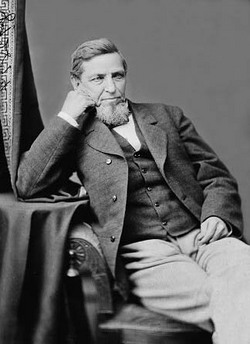
Jacob Kuechler (Republican) - originally from Hesse-Darmstadt he immigrated to Texas in 1847. An early communalist, before the American form of that ideology coalesced, he was part of the failed Bettina colony in Texas. A graduate, with degrees in Civil Engineering and Forestry, he is noted for pioneering the science of dendrochronology. Commissioned by Sam Houston to raise a militia he enrolled only pro-Union Germans before being dismissed by Houston's rebel successor. Kuechler remained a thorn in the rebel side, helping smuggle pro-Union Germans out of the state and supporting deserters from his base in New Mexico. On his return to the state he initially sought only to be state surveyor but his popularity amongst the newly empowered German-Texan community propelled him to the Senate...
Vermont:
George F. Edmunds (Republican)
George J. Stannard (National Unionist) - Vermont's senior war hero Stannard was an ardent supporter of Kearny's election to the Presidency. In order to ensure the state's voice was heard the legislature sent Stannard as a National Unionist to the Senate...
Virginia:
John Francis Lewis (Republican)
Franklin Stearns (National Unionist) - one of the state's largest property owners he was considered an enemy of the Confederacy and had spent part of the war in jail or under house arrest. Stearns was considered the leader of the spinners in the state and was partially responsible for the choice of John Sedgwick as their candidate for the governorship. Nonethless he couldn't quite bring himself to identify as a Republican and, arriving in the capitol, declared to President Kearny that he was, himself, a National Unionist...
West Virginia:
Peter G. Van Winckle (Republican)
Waitman T. Wiley (Republican)
Wisconsin:
James R. Doolittle (Republican)
Timothy O. Howe (Republican)"
Last edited:
Deleted member 81475
Now that's a senate! The Kearny Administration has the potential to be a transformative one if it maintains a functional relationship with congress. The National Unionists are probably a blessing in disguise to the Democrats. Their numbers may be at a historic low post defections, but a split between the radicals and moderates post-Kearny is their best chance at overcoming a massive structural disadvantage.
I don't think Shields would be selected from PA due having no connection to the state also his army career wasn't very distinguished in the Civil War more likely it would be the War Governor Curtin or General John Geary who was from PA. I personally think Curtin or an ally of his would be selected to keep a political balance as Curtin and Cameron were [once?] rivals.
I don't think Shields would be selected from PA due having no connection to the state also his army career wasn't very distinguished in the Civil War more likely it would be the War Governor Curtin or General John Geary who was from PA. I personally think Curtin or an ally of his would be selected to keep a political balance as Curtin and Cameron were [once?] rivals.
Geary is now the Governor. Shields proved repeatedly he could get elected in states he had little relationship with - in TTL because of his Irish-American credentials and because of the popularity of the "hanging" judges of the military tribunals in general. In TTL Shields has got himself involved with some of the Pennsylvania Railroads via Cameron's rather corrupt connections...
Like I mentioned that could be a negative since Cameron is in the senate already it could cause a split between more reform Republicans and his supporters. I thinks shields would be more likely to be in the south were he would probably have an easier time getting elected and have the means and ability to be a state leader in his party then in PA.
Threadmarks
View all 207 threadmarks
Reader mode
Reader mode
Recent threadmarks
Chapter One Hundred and Fifty Nine The Long Road Home Chapter One Hundred and Sixty A New Beginning Part I Chapter One Hundred and Sixty One A New Beginning Part II Chapter One Hundred and Sixty Two A New Beginning Part III Chapter One Hundred and Sixty Three The Emperor is Enthroned Chapter One Hundred and Sixty Four The Emperor's Coat-tails Part One Chapter One Hundred and Sixty Five The Emperor's Coat-tails Part Two Chapter One Hundred and Sixty Six The Consuls of His Empire
Share: